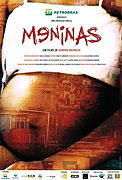
Plots(1)
On her 13th birthday Evelin realises that she is pregnant. The child's father is her 22-year-old boyfriend who has recently stopped working for dealers in Rocinha, Rio de Janeiro's largest favela. Evelin is surprised to learn that he is looking forward to becoming a father – she had expected a different reaction from him. Luana, 15, never once contemplated having an abortion when she found out that she was pregnant. Her father died when she was very young and she has been living with her four younger sisters and her mother in a household of women. As a young girl she was obliged to help her mother raise the younger children. Of late, she's often pondered what it would be like to have a child that "belongs to her alone." Edilene did not plan her pregnancy but did nothing to avoid getting pregnant. The same applies to her mother and so, mother and daughter now find themselves pregnant at the same time. Edilene is expecting a son from Alex, with whom she is very much in love. But Alex is a womaniser, and 15-year-old Joice is also expecting a child from him. Naturally, this love triangle is a real drama for Edilene, who is just 14. Director Sandra Werneck has spent three years capturing on camera the everyday lives of these three young girls. (Berlinale)
(more)Reviews (1)
The plight of underage girls of the favelas of Brazil. A topic so sturdy that it is shocking how little it is exploited. Each story could easily make a documentary in itself. A shame that the director has no sense for what is interesting. There are several moments in each of the stories when you find yourself saying “I want to know more". But in the vast majority of cases they don’t tell you anything more. Countless times it looks like it’s building up to something emotionally shattering. But again, it never gets to that point. In good hands, the fates of these girls could have been an outstanding and meaningful documentary. The director had the choice of several approaches to take. She could have focused on the social causes, the impacts on both mothers and fathers and their plans and dreams for the future, or on their surroundings. She could have shown the illusions of thirteen-year-old mothers seduced by young gangsters and their gradual disenchantment. She could have presented us a hopeless situation in the favela where children have children who have children: the “thirteen-year-old grandma generation". She could have. If she weren’t afraid of biting into the issue and digging deep, or at least a little under the surface. Sandra Werneck shows us a little of everything, but in the end that is nothing.
()